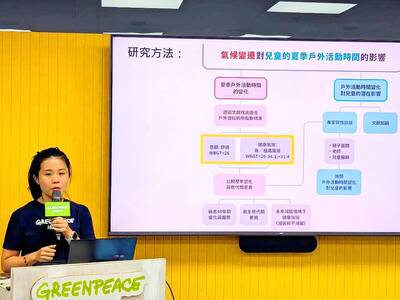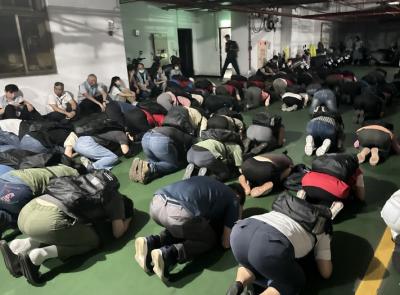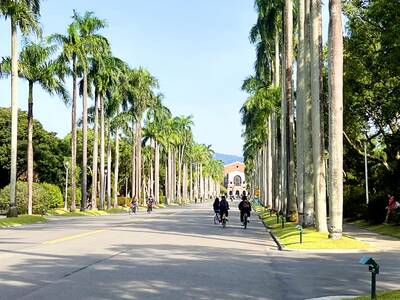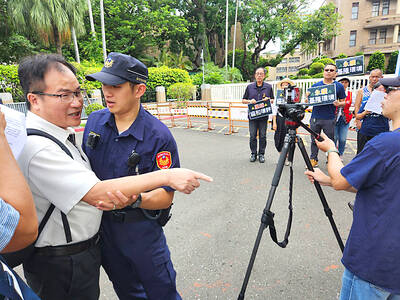The National Security Bureau (NSB) said on Tuesday that it had neither the technology nor the devices to disturb anyone seeking elected office.
The bureau’s press release came in response to repeated claims by People First Party vice presidential candidate Lin Ruey-shiung (林瑞雄) that he had been attacked by 18,750 kilohertz (kHz) electromagnetic waves for three consecutive nights from Sept. 20.
If Lin has any concerns about being disturbed by what he calls “electromagnetic radiation,” he could apply for a test by the “responsible government agency,” the bureau said.
According to Lin, he was unable to sleep for three nights and was eventually forced to move to a hotel, “otherwise I would have gone mad.”
He repeated his claim on Tuesday while campaigning in Greater Taichung and said he knew it was an electromagnetic radiation attack because he is a professional in that area. Lin is a public health expert whose specialty includes cancer risks from electromagnetic radiation.
It would require a sophisticated technique to launch such an attack, Lin said while visiting a high-tech company in the Central Taiwan Science Park.
The bureau quoted the National Communications Commission as saying that neither the military or the bureau nor any other government unit has applied to use the 1,875kHz frequency.
The bureau said it would never break the law by eavesdropping on anyone and that if its staff were monitoring a subject as part of their duties, they would abide by the Communication Security and Surveillance Act (通訊保障及監察法).

The government should improve children’s outdoor spaces and accelerate carbon reduction programs, as the risk of heat-related injury due to high summer temperatures rises each year, Greenpeace told a news conference yesterday. Greenpeace examined summer temperatures in Taipei, New Taipei City, Taoyuan, Hsinchu City, Taichung, Tainan and Kaohsiung to determine the effects of high temperatures and climate change on children’s outdoor activities, citing data garnered by China Medical University, which defines a wet-bulb globe temperature (WBGT) of 29°C or higher as posing the risk of heat-related injury. According to the Central Weather Administration, WBGT, commonly referred to as the heat index, estimates

Taipei and other northern cities are to host air-raid drills from 1:30pm to 2pm tomorrow as part of urban resilience drills held alongside the Han Kuang exercises, Taiwan’s largest annual military exercises. Taipei, New Taipei City, Keelung, Taoyuan, Yilan County, Hsinchu City and Hsinchu County are to hold the annual Wanan air defense exercise tomorrow, following similar drills held in central and southern Taiwan yesterday and today respectively. The Taipei Mass Rapid Transit (MRT) and Maokong Gondola are to run as usual, although stations and passenger parking lots would have an “entry only, no exit” policy once air raid sirens sound, Taipei

Taipei placed 14th in the Quacquarelli Symonds (QS) Best Student Cities 2026 list, its highest ever, according to results released yesterday. With an overall score of 89.1, the city climbed 12 places from the previous year, surpassing its previous best ranking of 17th in 2019. Taipei is “one of Asia’s leading higher-education hubs,” with strong employer activity scores and students “enjoying their experience of the city and often keen to stay after graduation,” a QS staff writer said. In addition to Taipei, Hsinchu (71st), Tainan (92nd), Taichung (113th) and Taoyuan (130th) also made QS’ list of the top 150 student cities. Hsinchu showed the

Environmental groups yesterday filed an appeal with the Executive Yuan, seeking to revoke the environmental impact assessment (EIA) conditionally approved in February for the Hsieh-ho Power Plant’s planned fourth liquefied natural gas (LNG) receiving station off the coast of Keelung. The appeal was filed jointly by the Protect Waimushan Seashore Action Group, the Wild at Heart Legal Defense Association and the Keelung City Taiwan Head Cultural Association, which together held a news conference outside the Executive Yuan in Taipei. Explaining the reasons for the appeal, Wang Hsing-chih (王醒之) of the Protect Waimushan Seashore Action Group said that the EIA failed to address